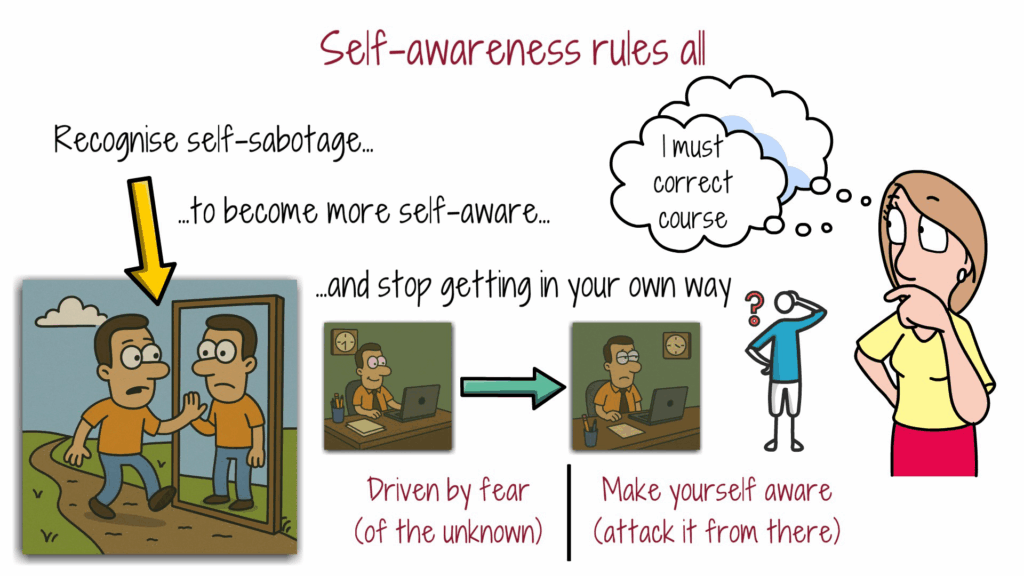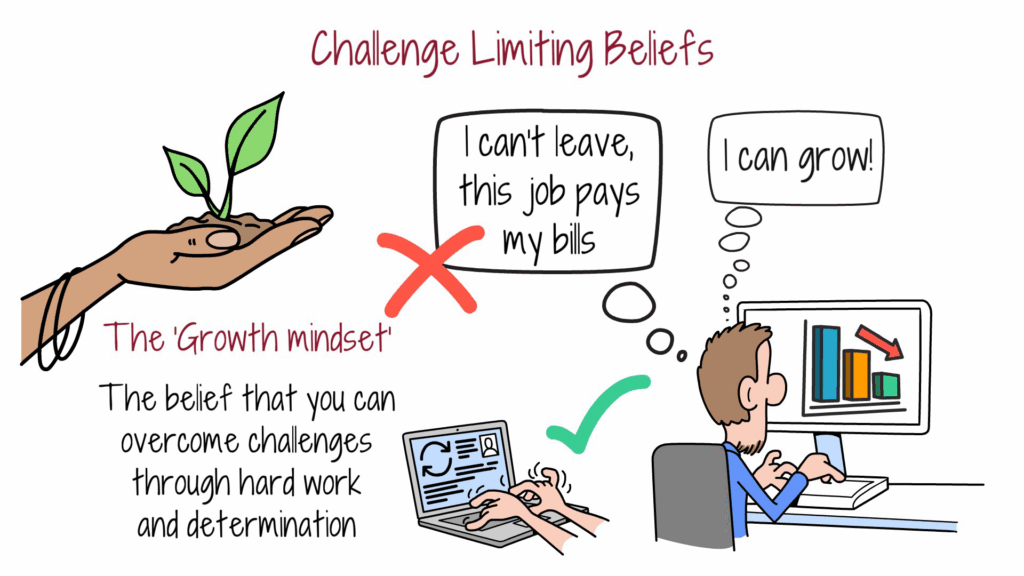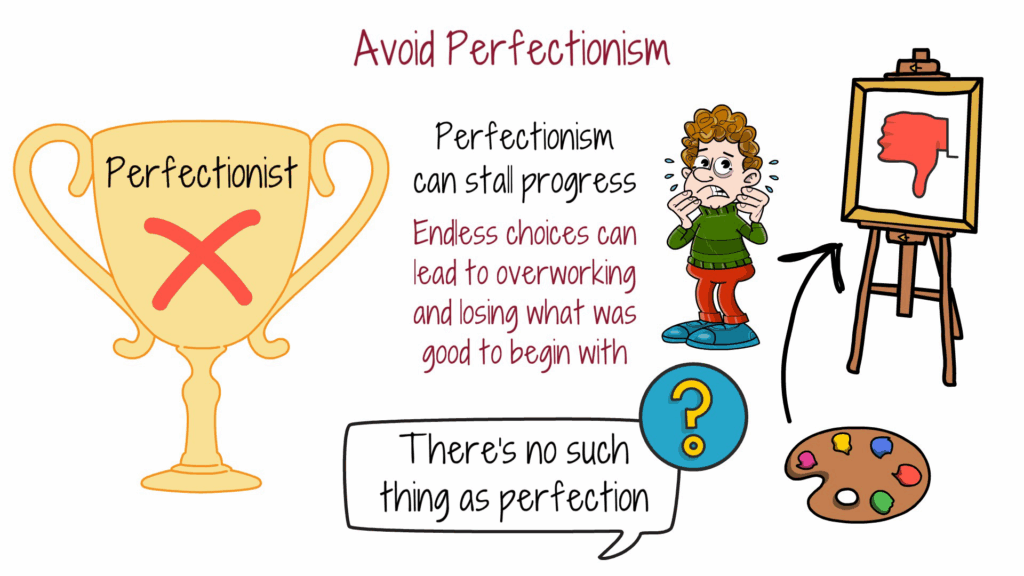“You need to stop getting in your own way.”
How many times have you heard that before? More to the point, how many times have you heard that before and truly understood what it means?
It’s a simple, well-used slice of advice yet its true meaning can feel quite alien. It makes sense, sure, but to embrace its sentiment, you must first dig deeper. Let’s use a real-life, common example.
Let’s say you lost your job in the past year, through no fault of your own. After some searching and interviewing, you manage to secure a new role. You’re excited – why wouldn’t you be? You’re getting back to how things should be. However, as the weeks go by and you’re still familiarising yourself with your new surroundings, self-doubt starts poking its head around the door. It’s small at first, but soon it’s wandering around your brain without restriction, getting larger and larger as the weeks go by. Before you know it, you’re playing up to that doubtful voice inside your head – ‘Oh well, it doesn’t matter, I won’t go into the office today, what’s the point?’
Long story short – you start cutting corners so when you do lose your job just like last time, it won’t be a surprise. You’ll be expecting it, as that’s what all employers do – even if the two circumstances are entirely different. In reality, you’d still be reeling from the experience of losing your previous job and, in an act of self-protection, not trying as hard in a thinly veiled attempt at giving yourself control.
In scenarios like this, the phrase ‘stop getting in your own way’ rings true.
People often get in their own way without realising. After all, how else are you going to deceive yourself? Whether it’s an act of unwitting self-preservation or not, getting in your own way can prove detrimental to achieving your goals because, ultimately, the responsibility lies at your feet and yours alone. Without the tools to realise what might be happening, self-improvement might be difficult to come by.
Fear not, however. These are tools that can be taught over time.
Before this article continues, you should keep in mind one thing when reading the points to follow: instilling self-awareness is the ultimate goal here, as it will help you to isolate the necessary factors in your life that might be holding you back. From there, you can figure out how to get out of your own way.
Self-awareness rules all
As touched on already, you may not be aware you’re getting in your own way. Self-sabotage is not a trait most people would care to admit, after all. While this may sound somewhat scary, fear not. By recognising patterns of self-sabotage, you can become more self-aware and stop getting in your own way.

For example, you may feel like you’re struggling to live the life you really want. You feel like everything you’re doing is correct, but still not much is happening. This might be because you’re being held back by a fear of being uncomfortable, for instance. To get out of your way, you must correct course.
Again, let’s use careers as an example. You’re in a stable job – one that you spent a lot of time and energy trying to get. A few months pass and you begin to feel as if things aren’t as they should be. It’s OK, but not the kind of OK you’re comfortable with. But nothing is glaringly wrong with your life, so what could possibly be the problem?
In this situation, your dream career might seem impossible to attain. You’ve chosen your lane, so it’s time to stick to it. Here, you’re driven by fear. Fear of the unknown – the discomfort that comes with taking a risk and breaking from stability – is the sabotager here. Taking time to make yourself aware of that means you isolate the issue and can attack it from there. You could ask yourself how you could change your career in all senses – practical, financial, emotional, spiritual.
That being said, isolating where you might be self-sabotaging might be a daunting prospect itself. After all, how do you know where to look if you don’t know how to look? Fortunately, it doesn’t need to be overcomplicated. If you’re looking to keep your personal matters to yourself, try journalling. While writing about and to yourself may feel strange at first, the more you do it, the easier it will become. Soon, your pen will flow and so too will your inner thoughts. Journalling has a knack for helping you come to realisations you didn’t even know were there.
What’s more, don’t forget the power of conversation. Talking with people going through similar experiences can be incredibly beneficial, as more often than not, someone will have gone through something similar. They can use their experiences to offer you some guidance; a springboard for you to come to your own realisations.
Essentially, building self-awareness is about taking the time to ask yourself some questions. To stop and reflect. Without it, you’re flying through life without navigation and barrelling towards confusion.
Challenge Limiting Beliefs
If you’re a keen follower of the self-improvement world, you will have likely heard about Carol Dweck and the ‘growth mindset.’ For those who are unfamiliar, it’s simply the belief that you can overcome challenges through hard work and determination.

People with a growth mindset don’t let factors about themselves, such as their job situation, determine how they grow as a person. In this instance, if you want to get out of your own way, adopting a growth mindset is the definitive path you should take.
As it’s been a common motif throughout this article, let’s stick with a career-based example. Let’s say you’re in a job that you don’t necessarily hate, but also don’t find invigorating or satisfying, especially in the long term. It may seem that, because it is providing you with security, you can’t leave. Therefore, you’re stuck in this job which you fear will inevitably wear you down and drain your energy. It may seem easy to get stuck in this loop. However, a growth mindset acknowledges that while you aren’t where you need to be now, with hard work and a lot of learning, you can, well, grow.
Of course, people will be looking out for you and rooting for your success. But, in reality, how much you believe in yourself will prove to be a significant factor in determining your life. After all, no one can look out for you as much as you look out for yourself. How does the saying go? ‘You only get what you put back in.’
Not only will a growth mindset help you push through the nitty-gritty of the daily grind, but it can also help you unlock your potential and embrace possibilities. Sure, not everything in life is a lesson, but being receptive to the idea that you could learn something when you do and don’t expect it will make you a more optimistic person and, as such, enable you to see where you might be getting in your own way.
Avoid Perfectionism
“There’s no such thing as perfection.”
If that’s the case, why do we all so often keep seeing how close we can get to it? While the phrase ‘perfectionist’ seems like a prestigious title on the face of it, the reality isn’t always optimal.

A perfectionist risks freezing their progress in fear of mistakes. For anyone not accustomed to painting, for example, the almost limitless choices at your disposal can at first feel liberating, but the more you paint, the more difficult it can become. You might not have the skills or vision to paint a masterpiece (not yet, anyway), so you keep going. Just a bit more, you might say to yourself. Before you realise it, you’ve lost something you liked more beforehand because you didn’t know when to stop.
It can be a fine line. Striving for perfection is a good thing – don’t get it mistaken – but being a perfectionist can prove detrimental to your progress. Accept imperfection and understand that progress involves learning from stumbles. With that acceptance comes self-awareness, the all-important tool for getting out of your own way.
Remember, take a step back and ask yourself: ‘Have I done all I can here?’
Getting out of your own way
So, there you have it.
Getting out of your own way can mean different things for everyone. Some of the tips featured in this article may not apply to you, but if there’s one thing you take away from this article, let it be this: self-awareness will get you far. It will help you identify the gaps in your life so you don’t waste time falling through them.
Strive for self-awareness, always. After all, you should be helping yourself, not getting in your own way.
